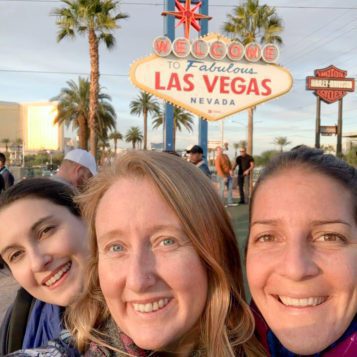Las Vegas, in Nevada’s Mojave Desert, is a resort city famed for its vibrant nightlife, centred around 24-hour casinos and outrageous entertainment. The main boulevard known as ‘The Strip’ is home to themed hotels with elaborate displays such as fountains synchronised to music as well as replicas of Egyptian pyramids, the New York skyline, and the Eiffel Tower.

Myself (middle), Abi (left) and Effy (right) exploring ‘The Strip’
As a marine ecologist that has spent much of the last decade of my life working alongside small-scale fishing communities on the west coast of Madagascar, walking through this brightly lit and bustling city was miles beyond my comfort zone. Luckily I was also joined by fellow biologists Effy Vessaz and Abigail Leadbeater who were able to help me navigate this new and bewildering landscape.
But what were three Blue Ventures staff doing in Las Vegas? Well among other things we and 20,000 other people in Las Vegas that week were united by our love of DATA! We were here in Vegas to attend Tableau Conference 2019.
Data analytics is the new language of business whether you are a Fortune 100 company, an exciting new startup, or a not-for-profit organisation trying to make a difference in the world. “Data is becoming ubiquitous; it will touch everyone” (as CEO Adam Selipsky said in his opening keynote). Already today much of our decision making is supported by data; whether that is using your phone to decide if you should take an umbrella or sun cream (or probably both if you live in the UK!) whether you should eat a fish that is on the menu (thanks to an online Good Fish Guide), or where the most recent outbreaks of disease are about to hit so the World Health Organisation and others can deploy medicines and vaccines accordingly.
Blue Ventures’ value of Grounded in Evidence is one that is extremely important to how we work. It means that we have high standards and are not afraid to be self critical. If we see something that doesn’t work we change tack until we are on the right course.
Yet how we use data to recognise when things aren’t working, or deciding how to change course, is highly variable. Like many organisations, we are collecting a huge amount of data. But many of the current systems and processes we have in place are slow and mean that it can be a struggle to get information back to the team or the communities we work with quickly enough to inform their decision making.
Most of the world will make decisions by either guessing or using their gut. They will be either lucky or wrong.” Suhail Doshi, Mixpanel
We want to change this so that we can continue to support communities across the tropics to make more informed decisions about community development and resource management projects. Blue Ventures has been using Tableau (a data analytics and visualisation software) for the last couple of years (examples here and here) to help us visualise our data and make it accessible to the communities we support, as well as our staff.

We left our marine conservation mark on the Tableau ‘graffiti wall’…
Tableau was designed for analysts working in a wide range of organisations, and while many of their early customers came from the corporate and government sectors, their growing community of users, referred to fondly as the “data family”, increasingly includes not-for-profit organisations. The Tableau Foundation supports not-for-profits to leverage data in a way that enables them to achieve their mission. In 2019 we were awarded a grant from the Tableau Foundation which will help us to scale up our use of Tableau across Blue Ventures and to develop a culture of using data for learning throughout the organisation, our network of partners, and among partner communities.
We’re starting our journey towards a ‘data-first’ culture that will help us to continue to support communities in decision making. However, we’ll only achieve this if our teams are working with a common understanding of why data matters. Building this data culture requires an ongoing commitment to open communication, professional development, and fostering a genuine, collaborative environment where data is a fluency for all, regardless of function. Everyone needs to be “all-in” on data.
As Abi, Effy and I finished up the week in Vegas and returned to our day jobs, we are brimming with ideas of how we can put this into practice. From bolstering our existing internal community of data and Tableau ambassadors, to developing new internal and shared staff training resources, and maybe even holding our own Iron Viz competition, we can’t wait to start!
Just as importantly we need to continue to work to build data skills within communities; involving fishers, community health workers and other project participants at all stages of the data cycle. This can be made easier through integrating new technology to support data capture and analysis and visualisation, but we also need to continue supporting data literacy for fisheries management.
The Tableau conference has certainly been an experience that has stretched my belief about what it means to be data driven. To see the Tableau community and hear stories of how data has changed hearts and minds in other organisations is a beautiful thing. We all want to bottle up the magic from Vegas and bring it back to Blue Ventures. For us, what happens in Vegas, won’t stay in Vegas!

We love DATA!


This is great news!
I was a volunteer at Timor Leste site Atauro in 2018 and I remember wondering how you managed all the data behind the scenes.
Certainly, putting in data via excel as well known as it is starting to be a bit outdated?
I am interested to see how this helps you day-to-day as well as in your ability to communicate your findings.